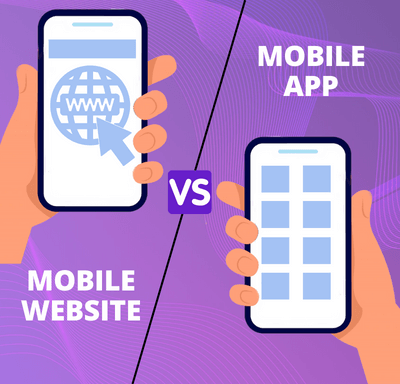
About us
Our Services
Our Expertise
Our Experience
Follow us
Why e2logy?
- We strive to provide superior customer service and ensure that every client is completely satisfied with our work.
- Our engineers are trustworthy, dedicated, and experienced and will go the extra mile to solve your IT issues.
- We are committed to delivering outstanding, cutting-edge IT solutions that add real value that goes beyond what is expected.

Mobile App Vs. Mobile Website: Which is the Better Option?

The trend of companies embracing mobile strategies is growing, as evidenced by the fact that they are becoming increasingly aware of how important it is. Moreover, mobile app usage has surpassed desktop usage as well as the number of users only using mobile internet. Mobile strategies are being rethought by companies as a result of this shift. In fact, their major dilemma has been whether to create a mobile app or a mobile site.
Mobile apps are not necessary if your website is mobile-friendly. Other people believe that mobile apps have an advantage over websites. However, there are many factors to consider before making a decision. You may find it challenging to decide where to devote your efforts when considering different mobile media. To align your mobile strategy with your organization’s goals, we examine the pros and cons of each choice.
What is a mobile app?
Using a browser is the same as accessing content on a mobile website. Mobile-specific, it is not perfectly viewed on desktop computers because it is designed specifically for mobile devices.
A responsive website is another way to optimize websites for smaller screens, as well as mobile devices. Using a browser, users view HTML pages connected to a responsive website. There is nothing unusual about this place. This type of website, however, can be viewed on a screen of any size, unlike a typical website.
Besides being mobile-friendly and working well with desktop applications, it also works well with smartphones and tablets that have touchscreens. The same applies to mobile sites as well as responsive web designs.
Mobile and responsive websites work perfectly for marketing and PR campaigns and outreach strategies. You can boost and support your mobile marketing campaign by setting up a mobile website, as it is more compatible, accessible, and maintainable than a mobile application.
The benefits and limitations of a mobile website will help you decide whether or not you should choose one over the other.
Advantages of Mobile App
A mobile app can provide several benefits, so let’s take a closer look at them.
It’s convenient: As smartphones are more convenient than websites, apps are quite popular. Users prefer mobile apps because of their ease of use, speed, and better user experience. Aside from that, apps are equipped with push notifications, unlike websites. Customers are also more likely to remain loyal and engage with the mobile app if special features, updates, and reminders are shared within it. In addition, mobile apps are more flexible than websites when it comes to screen sizes.
Personalization: For services that require regular use, mobile apps are an excellent solution. An application displays preferences create personal accounts, organizes information, and allows users to keep vital information at their fingertips. Developing marketing campaigns for different groups of users is easier with mobile apps from a business perspective.
Branding Opportunities: Mobile apps offer users new branding opportunities since they are separate from a company’s website. As a result, companies can experiment with new marketing techniques and styles using mobile apps. Apps for mobile devices offer users a unique experience. You may want to consider a mobile app if your website isn’t able to provide enough value for your customers.
Access offline: There is no need for an internet connection to run mobile apps. The app can still provide content and functionality to the users when the connection is not available, even if it requires an internet connection to function. By doing so, users will be able to access information anywhere, at anytime.
Disadvantages Of Mobile Apps
It’s now time to know about mobile apps’ disadvantages. Let’s start then.
Compatibility: A mobile app must fulfill all the requirements of the operating system it is designed for to work correctly. A different app version is required for each platform – Android, iOS, and Windows.
Cost: It is always expensive to develop a mobile app. To create a successful mobile app, the operating system should be taken into account. It is, for instance, not possible to run an Android app on iOS if it was developed for Android. Due to this, you will have to develop two applications to reach the maximum market, which is quite expensive.
This situation can, however, be resolved. Powered by Flutter technology, hybrid or cross-platform solutions are always possible. It is always more profitable to use this kind of app for business purposes, as it has many advantages.
Maintaining and supporting: It also takes more time and money to support an application developed for multiple platforms. Upgrades and fixes to compatibility issues must be provided to every type of device – and they must be done constantly. Moreover, you should inform your users about these updates and encourage them to update their apps. Getting approval from the markets where your app is available is another issue related to maintaining an application.
What Is A Mobile Website?
An Internet site that is accessible through a browser is called a mobile site. On a desktop, it is not perfectly displayed since it is specifically designed for mobile devices.
Yes, you did get it right; it’s a responsive website. Apart from mobile, there’s another broader concept of websites optimized for smaller screens.
HTML pages linked together makeup a responsive site, which is viewed in a browser over the internet. Despite being controlled to display perfectly on all screens, you will catch up with extraordinary things here.
The theme performs well on mobile-friendly sites as well as on desktop and tablet versions. Responsive web design complements mobile websites well.
An effective PR campaign, marketing campaign, or outreach strategy relies on a mobile or responsive website. In terms of accessibility, compatibility, and maintenance, a mobile website is superior to a mobile app.
Advantages of mobile website
Mobile websites have a responsive design and are designed to work on multiple screens. Mobile-specific versions of regular websites are used for mobile devices. A mobile website offers the following benefits:
Responsive: Simply put, such websites can be viewed on any device and adapt to any screen size. When the environment changes, they act as fluids, squeezing or scaling up their elements accordingly. Since this approach requires only one website design and code base, it is considered the most cost-effective.
Reaching a wider audience: Mobile websites are easily accessible and shareable across platforms. The second advantage lies in search engine visibility, since it can be found and downloaded on both Google Play and Apple App Store without having to search for it.
Compatibility: Users experience a website differently depending on the type of mobile device they are using. An application for a mobile device, on the other hand, must be developed separately for every operating system and type of device. Compatibility is especially important for users who own multiple types of devices. Moreover, QR codes and text messaging are easily integrated with them.
Cost-Effective: The cost of developing a mobile app can be higher than that of a responsive mobile site depending on the complexity of the project. Your app should be available on multiple platforms if you want to expand its reach.
SEO And Brand Visibility: The ranking of mobile-friendly sites in search engine result pages is higher today than that of non-mobile-friendly sites. The visibility and traffic of mobile-friendly websites increase for companies that have them. They maybe less expensive, but engagement and personalization are limited as well.
Disadvantages of mobile website
Considering both the negative and positive sides of each solution is essential to fully understand the ‘mobile apps vs mobile websites’ debate. In light of the advantages we have already discussed, it’s time to touch on the disadvantages of a mobile website.
Convenience: The features of a smartphone application cannot be replicated on a responsive or mobile website. A mobile website on a mobile device may not always take advantage of GPS, cameras, phone dialing, or other mobile device features.
Offline Access: It is still possible that your mobile website will only work offline with limited functionality if it has been designed in the lightest and most informative way possible. An internet connection is required to run a mobile website, as opposed to a mobile app, which runs locally.
User Experience: Apps deliver a great user experience, which is one of their key advantages over websites. Apps for mobile devices take into account the device’s peculiarities and screen size when designing them. As a result of browser limitations and the overall low cost of mobile websites, websites can provide a not-so-great user experience.
Which Is The Better Option?
In terms of choosing between a mobile application or a mobile website, your business objectives will determine the right choice. Having a mobile website is probably the best way to offer mobile-friendly content to a wide audience. If you want to improve customer engagement, interaction, and communication, a mobile app is a great choice. Your mobile website and mobile app maybe needed in many cases. It is possible to make both of these choices strategically and valuable if they are done correctly. Your brand’s mobile strategy shouldn’t revolve around one mobile website or one mobile app, but rather a two-pronged strategy.
Final Thoughts
When choosing an app for your business, there are many factors to consider. Before making a decision, it is generally a good idea to mark your requirements. It is possible to make both choices strategically and valuable if done correctly. Whether you’re creating a web app or a mobile app, give your users the best experience possible by keeping your users in mind.













